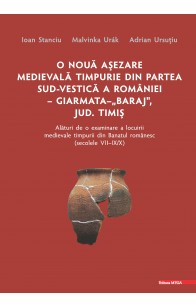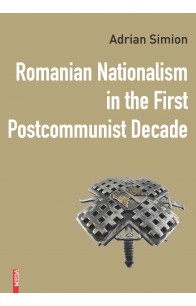Rezultate căutare pentru 'Adrian Ursu��iu'
SOMMAIRE
Laura T. Ilea, Repenser le politique à travers des imaginaires dispersés
Imaginaire spatial et réflexion politique/Spatial Imaginary and Political Reflection
Amaryll Chanady, The Spatial Imaginary and Literary Reflections on the Political
Nicolas Beauclair, Vecteurs identitaires des discours autochtones : affirmation dʼune ontologie politique
Simon Harel, La route et la loi du père (jusquʼà La route de Cormac McCarthy)
Yoshiro Sakamoto, Ştefan Baciu, Archipelagic Poet from Romania
Dana Bizuleanu, Exploring Diversity: The Literature of Migration
Silviu Lupaşcu, Le Sabre et la plume à écrire. Espaces politiques, spirituels, angéliques dans le système philosophique dʼIbn Khaldun
Éthique du commun et puissance/Ethics of the Commons and Power
Érik Bordeleau, Exercices dʼauto-virtualisation dans lʼélément anonyme de la pensée
Isabelle Galichon, Lʼinjonction à témoigner du « Parlement des invisibles » :Entre expression émancipatrice et représentation inachevée
Horea Poenar, Ethics of the Commons. Art and the Dislocation of the World
Hubert Gendron-Blais, Dimensions sonores du politique : recherche-création autour des sons des mouvements
Ion Copoeru, La voix et la honte. De la narration impossible à la possibilité narrative
Claudio Clivio, Emanuele Severino, Diego Fusaro et la critique de la Multitude
Francis Douville Vigeant, Pensée politique et pacifisme chez Stefan Zweig
Arts et politique/Art and Politics
Ruxandra Cesereanu, Andrei Codrescu – An Anarchetypal Writer
Laura T. Ilea, Lʼimaginaire est apolitique : Pierre ou les Taches solaires de Vlad Zografi
Călina Părău, Remembering Images: Cinema Thinking the Century
Cristina Eșianu Farcaș, Logiques de la jetabilité : Dépossession et voix off dans le documentaire dʼanimation Le voyage de M. Crulic
Nicoleta Popa Blanariu, A Transdisciplinary Deconstruction of Ideology. Gnostic Alchemic Imaginary, Dialectic Materialism and Atomic Physics in Vintilă Horiaʼs Novels
Utopies et hétérotopies /Utopia and Heterotopia
Corin Braga, Utopies féministes modernes et rêves de parthénogenèse
Marius Conkan, Heterotopias: Making and Remaking Imaginary Spaces
Radu Toderici, Les allusions à lʼutopie – que nous disent-elles sur lʼhistoire du genre utopique ?
Politique et mentalités /Politics and Mentalities
Ştefan Borbély, The Year 1968 in Romania and Two Literary Aftershocks
Adrian G. Matus, The Reception of the American Counterculture in Communist Romania (1960-1975). The Rebels with a Cause
Doru Pop, Patriarchal Discourses and Anti-Feminine Attitudes in Romanian Political and Media Cultures
Denis Fleurdorge, Les représentations du politique. De la symbolique du pouvoir au pouvoir de la symbolisation
Jean Libis, Les arbres et la forêt ou lʼâge dʼor des gauchismes français
Adagio: Thèses politiques/Political Theses
Călin Andrei Mihăilescu, Theses on Political Reimagination
Book Reviews
„A rămas destul de puţin cunoscută evoluţia locuirii medievale timpurii din partea românească a Banatului, cu presupuse schimbări intervenite în decursul vremii, alături de eventuale tendinţe și aspecte specifice. În lipsa altor surse la îndemână, fără îndoială că noi contribuţii sunt de așteptat din partea arheologiei. În ultimele trei decenii, rolul decisiv a revenit săpăturilor preventive, într-o măsură sau alta fiind investigate și în acest spaţiu noi situri, din păcate cu rezultate doar semnalate, cazul celor mai multe dintre ele. Cel de la Giarmata–Baraj a fost identificat în anul 2011 pe traseul Autostrăzii Timișoara–Lugoj, urmând la scurt timp cercetarea arheologică preventivă, susţinută de un colectiv al Institutului de Arheologie și Istoria Artei al Academiei Române din Cluj-Napoca.” (din „Cuvânt-înainte”)
Romanian nationalism has been and it still is a research topic that has generated and still generates various controversies, both at the level of the opinions of the authors who have dealt with this subject, and at the level of the interpretations that the reader can have on such a topic. And the analysis of the evolution of Romanian nationalism since 1989 is a theme that can be included in this framework of different, and sometimes even contradictory, approaches. Moreover, any analysis of post-communist Romanian nationalism may have its limitations, in terms of the authors’ approaches, and because, in general, approaches to nationalism have a certain potential for inaccuracy. The nationalist phenomenon is very complex because it refers to the people (the nation) and the country and quite often the boundary between nationalism and patriotism, for example, is quite weak. And in the Romanian case, things were even more complicated, both because the nationalism responded to a need for homogeneity existing in the post-communist Romanian society, and because the Romanian nationalism had a specific and quite complex typology.
In this paper, we referred more to those aspects that looked at the presence of nationalism in areas such as society, culture, religion or interethnic relations. Moreover, the period chosen for the study was rather a delicate one, considering the fact that the last decade of the twentieth century was, for Romania, a period of search of the road that the country needed to straighten, after half a century of totalitarian regime. And studying nationalism in such a historical context may have different interpretations, especially since post-communist Romanian nationalism, as some Romanian authors have stated, could be considered as paradigmatic for nationalism in general, because of its subtlety and complexity. (from the „Introduction”)






